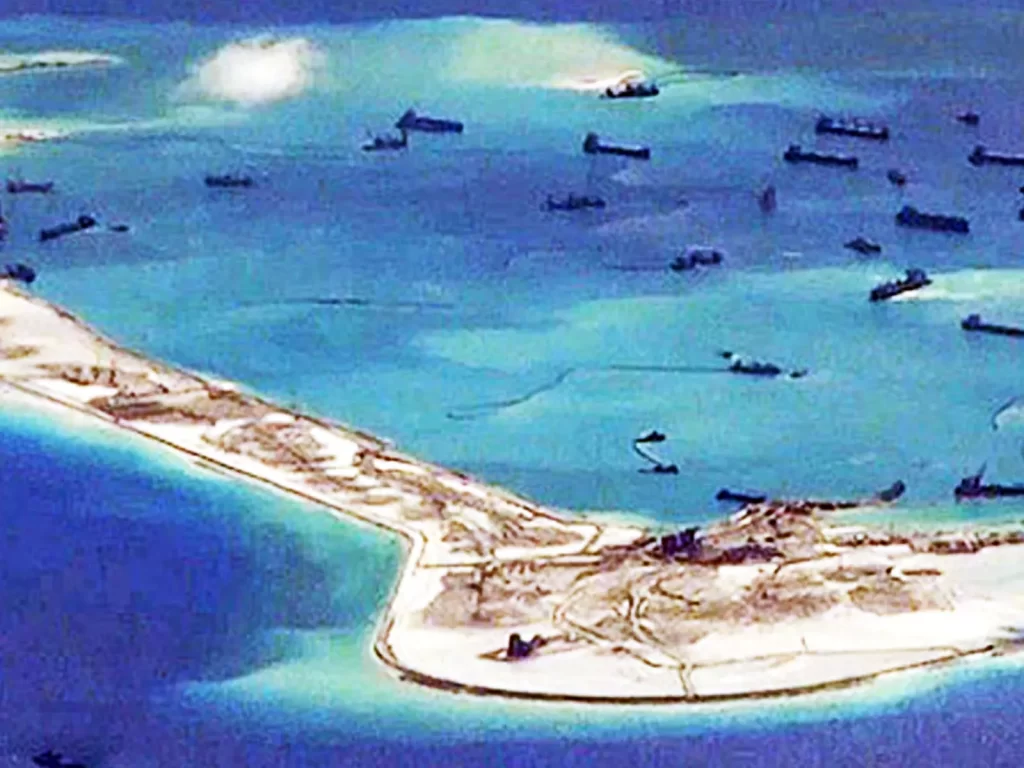Ronald Goseco l November 22, 2024 l The Manila Times

WHILE security tensions in the West Philippine Sea (WPS) have attracted a lot of reports, very little attention has been focused on the resources that have been withheld by China within our exclusive economic zone (EEZ). This article will discuss what we are losing and why we need to get them back.
The EEZ has an estimated area of 2.2 million square kilometers (sq km), which is even bigger than our total land area of 300,000 sq km. On a recent visit to Pag-asa Island with the Philippine Air Force Multi-Sector Governance Council, we were able to see for ourselves the presence of a long flotilla of Chinese militia ships, coast guard vessels and even a naval ship sailing just off Pag-asa Island.
We also got a chance to see Panganiban Reef, also known as Mischief Reef, located west of Palawan. The reef is well within the Philippine EEZ and had been a traditional Philippine fishing area, but it is now under the de facto control of China, which built an artificial island on top of the reef. It installed a complete military facility with a runway, a port and an extensive weapons system.
Although the territorial claims of the Philippines are defined by the United Nations Convention on the Law of the Sea (Unclos), it is painfully clear to us that China has taken over control of this area. This has affected the livelihood of millions of Filipino fishermen who could no longer venture out into these traditional fishing grounds.
Overfishing and illegal fishing practices conducted by the larger Chinese vessels have also destroyed vital marine ecosystems. The destruction from Chinese reclamation has also damaged critical coral reefs and depleted fishing stocks for generations.
Several exploration companies have confirmed large deposits of natural gas and oil in the area, particularly at Recto Bank. These deposits are essential for Philippine energy security, but the threats from the Chinese navy have practically halted exploration despite the recent lifting of the exploration moratorium by Malacañang this year. The development of seabed mineral resources, which include manganese and nickel, have also been stopped because of Chinese assertive control on the areas.
It is unfortunate that China has refused to recognize Unclos and the 2016 arbitral ruling. We also could not reach a consensus with Asean, or the Association of Southeast Asian Nations, on the Code of Conduct in the South China Sea because of conflicting diplomatic views. This is extremely crucial, because no single nation stands a chance in opposing China, or even the United States for that matter.
It is very clear that the potential consequences of these developments will be severe. The economic losses from our reduced fisheries output and our inability to develop energy projects would have long-term effects on our economy. The environmental degradation caused by damage to our marine ecosystem would affect future generations.
We urgently need to build a stronger maritime patrol and defense system to ensure our territorial integrity. That seems to be the only way, since appeasing China, which the previous administration attempted to do, clearly did not work.
We can still achieve this by collaborating with like-minded nations that still believe in the rule of the law. Some developments have been established this year with the Quad countries. This is the diplomatic partnership between Australia, India, Japan and the United States, who share a vision for an open, stable and prosperous Indo-Pacific region.
This is actually an old partnership, established in 2007, but was recently revived because of the growing tensions in the region. Recently, a new quadrilateral partnership called the Squad was organized between the Philippines, the United States, Japan and Australia to address the increasingly aggressive harassment of Philippine patrols and resupply missions in the disputed waters.
We all want a peaceful resolution, but it has become clear that we have to take advantage of these old and new treaties. These so-called minilateral initiatives under Squad would help us leverage international support for resource protection and promote resource sharing agreements.
While doing all this, we have to consider the fact that China is still the Philippines’ largest trading partner. Data as of September this year shows that China exported $3.87 billion and imported $1.8 billion from the Philippines. We only have to look around in traffic to see the significant entry of brands like BYD. I was just reminded of this myself during my visit to our thermal plant in Calaca, which has a boiler from DongFang and turbines from Harbin.
Despite all these tensions, our Filipino diplomats have been hard at work in establishing stronger bilateral economic ties with China. This almost sounds incongruous, but this is the reality that we live in. We have to be mindful, though, that this balancing act between empires should, in the end, benefit us. We need to address these challenges as a nation united in the goal of protecting Philippine resources for our national security, economic growth and even our existence as a sovereign nation.
Ronald Goseco is a Finex Foundation trustee. His opinions are his own. Photo from Pinterest/Google.

